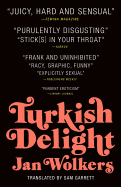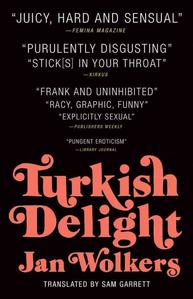
 Jan Wolkers's 1969 novel Turks Fruit was translated from the Dutch into many languages and adapted into a highly regarded 1973 film. Sam Garrett's English translation is not the first of this work, but reflects its continuing appeal.
Jan Wolkers's 1969 novel Turks Fruit was translated from the Dutch into many languages and adapted into a highly regarded 1973 film. Sam Garrett's English translation is not the first of this work, but reflects its continuing appeal.
Turkish Delight opens with the unnamed narrator, a sculptor, lamenting and railing against his lost love. He describes in great detail a surfeit of sexual affairs undertaken after she departed, then flashes back to describe their first encounter: Olga picked him up as a hitchhiker, then pulled over the car for the first of their sexual enthusiasms. Olga is the heart and life of this novel and of the narrator's existence: he obsessively recites and reviews her body, her sex, her red hair, her love for animals, her jokes and delights. The lengthy flashback sees their relationship and, later, marriage run its course (his evil mother-in-law plays a heavy role), and returns again to the sculptor's tortured single life. His love for Olga does not flag, even as she degrades herself (in his eyes) with subsequent marriages and physical decline. The novel ends at Olga's deathbed, where the former lover feeds her the soft candy Turkish delight, as her teeth fail her.
Not for the faint of heart, Turkish Delight was immediately notorious upon its original publication for its graphic sexual content, and decades later remains a frank, granular portrayal of sex, bodily fluids and coarse language. It has much to offer beyond shock effect, however. The narrator's tone is unapologetic, and if he is fixated on Olga's body and its pleasures (and equally detailed in describing his later lovers), his message is as much romantic as it is sexual. On the one hand, he worships Olga as a romantic ideal, and on the other, speaks in a recognizable, colloquial, even familiar voice. It is easy to see how shocking, even revolutionary Wolkers's writing appeared in 1969, and it holds the power to provoke today. But it is also an honest view of a sticky love affair, one made of sweets, devotion and passion, as well as cruelty and obsession. Fittingly, Olga and the sculptor welcomed a menagerie of animals into their home together, and in a way their relationship ends as violently as a pet destroyed with an accidental crunch, "as though the little bird was built around a wooden frame."
Garrett's translation of Wolkers's prose is often lyrical and always heartfelt; the juxtaposition of poetry with crude language echoes the narrator's passionate love and enormous lust. Turkish Delight is a serious and artistic literary work, but only appropriate for readers fully tolerant of graphic sex. --Julia Jenkins, librarian and blogger at pagesofjulia
Shelf Talker: A Dutch novel of 1969 still titillates with its sexual content, but deserves serious consideration for style and themes, too.

